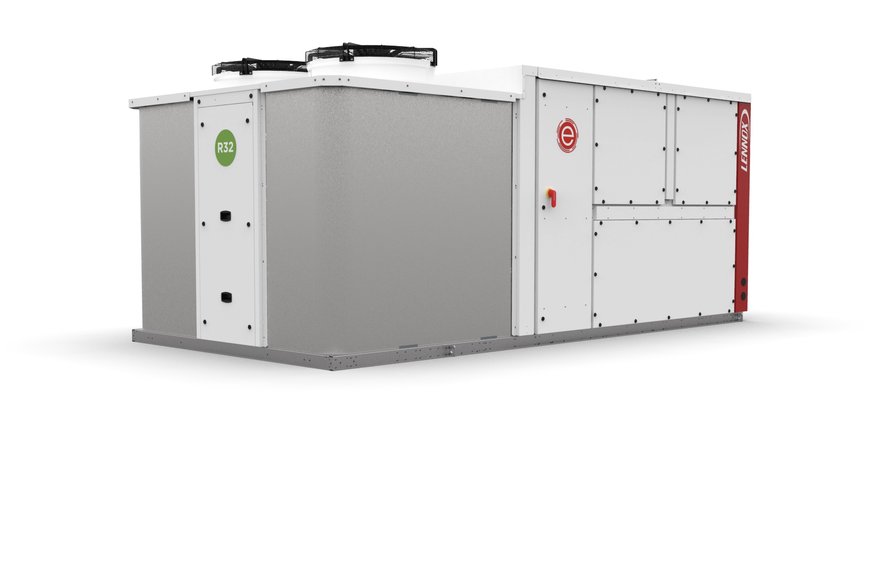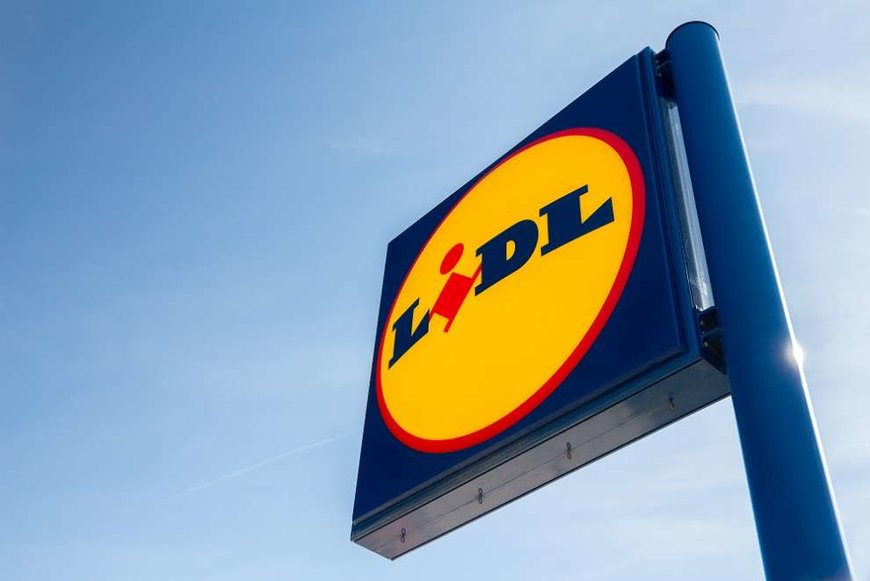smartbuildingmag.com
21
'20
Written on Modified on
LENNOX EMEA
Lidl leads the way in the ecological transition, by installing the world’s first R32 rooftop air-handling units supplied by Lennox
A Lidl supermarket in the suburbs of Paris is becoming the world’s first user of the e-Baltic unit for energy-efficient delivery of hot and cold air. Lidl a pioneer in the ecological transition and committed to control its energy footprint has partnered-up with class-leading air-handling specialist Lennox to install advanced e-Baltic rooftop units in its new stores.

One key requirement for the operation of modern retail outlets is a secure power supply. Providing a broad assortment of products, offering fresh foods daily and creating sophisticated shopping environments entail a high energy demand. Rising energy prices and the effects of climate change are increasingly prompting European retailers to address the challenge of steadily improving their energy efficiency. On average, three quarters of the total energy demand of a sales outlet account for power consumption.
Energy-efficient rooftop units
There is increasing scrutiny across Europe on the impact of industry upon the environment. For this reason, the European Ecodesign regulation aims to support the design of products that combine energy efficiency and the rational use of resources. The aim is to promote eco-design in all devices that consume energy, including heating and cooling systems.
As a pioneer in the transition towards a sustainable planet, Lidl’s ambition is to be able to produce more energy through their stores than they consume. To achieve this ambition, one of the aspects to consider is to reduce energy consumption and has partnered up with Lennox to install the world’s first R32 preproduction rooftop units in its brand new store in the suburb of Paris.
The advanced e-Baltic unit, commissioned in January 2020, is fully compliant to the forthcoming 2021 Ecodesign regulation, and the French response to the EPBD (Energy Performance of Building Directive) regulations, RT2012. This world-first installation is seen as a key milestone in the industry and, moving forward, Lennox strategy is to adopt R32 as a replacement for R410A due to its low Global Warming Potential (677 versus 1924) and its affordability.
R32 for reduced carbon footprint
R32 has many notable advantages that makes it the ideal replacement for R410A. It is a pure and economical substance, that is not patented and therefore, available from many suppliers. Another factor in R32’s favor is its low GWP, 65% lower than the GWP of the R410A. GWP stands for Global Warming Potential and represents the amount of energy absorbed by a refrigerant - and therefore the heat it releases into the atmosphere - relative to the same mass of CO2. But, as explained by Ricardo Freitas, Vice President, and Managing Director at Lennox EMEA, “what’s most impressive about this product is not only the fact that it uses R32 as a refrigerant, but the design of the product itself enables to considerably cut the refrigerant charge by up to 30%. In other words, the e-Baltic will contribute to major carbon dioxide equivalent reduction by using R32 as a refrigerant, but also by using less refrigerant than any other standard rooftop”.
Speculative cost must also be considered in the refrigerant selection decision. Mr. Freitas explains further,” the challenge here is to not only be prepared for new regulations but to absorb the inflated prices of refrigerants with high GWP. The risk of shortage means that prices are rising, a trend that is set to continue. Users will not have to face this problem with R32. The use of R32 as a refrigerant combined with a lower refrigerant charge will enable a decrease of the Carbon Dioxide equivalent; and thus, generate tax reductions by 75%”.
In this context, Lennox has worked on designing new products that would provide cleaner air while using R32 as a new refrigerant; and is, therefore, the manufacturer offering the very first rooftop on the market using an alternative to R410A. In fact, the e-Baltic choice has enabled Lidl to halve its impact on the ozone layer while reflecting its commitment to responsible ecological investments.
Perfect choice
Ideal for food and non-food retail outlets, as well as restaurants and larger shopping centers, the e-Baltic is part of the comprehensive Lennox range of air-cooled rooftop packaged units. These autonomous air-handling machines offer plug and play capability for the delivery of hot and cold air, in any season. Through the Lennox Cloud, connectivity allows permanent monitoring of the e-Baltic; which offers the potential to implement preventative maintenance routines. This means that at any time of the day or night, Lidl can access all the performance metrics of the e-Baltic units to ensure optimal use.
The product utilizes many sensors and advanced software based on the company’s experience and know-how, ultimately helping users such as Lidl predict any risk of downtime and plan maintenance operations accordingly. The ability to predict and forecast those operations can save companies such as Lidl considerable time, resource and money.
"This world premiere is a true partnership between Lennox and Lidl; one that will certainly help reduce the total cost of ownership thanks to a significant reduction in energy consumption and maintenance requirements”, concludes Mr. Alex Baudart, head of the store construction department at Lidl France.
Energy-efficient rooftop units
There is increasing scrutiny across Europe on the impact of industry upon the environment. For this reason, the European Ecodesign regulation aims to support the design of products that combine energy efficiency and the rational use of resources. The aim is to promote eco-design in all devices that consume energy, including heating and cooling systems.
As a pioneer in the transition towards a sustainable planet, Lidl’s ambition is to be able to produce more energy through their stores than they consume. To achieve this ambition, one of the aspects to consider is to reduce energy consumption and has partnered up with Lennox to install the world’s first R32 preproduction rooftop units in its brand new store in the suburb of Paris.
The advanced e-Baltic unit, commissioned in January 2020, is fully compliant to the forthcoming 2021 Ecodesign regulation, and the French response to the EPBD (Energy Performance of Building Directive) regulations, RT2012. This world-first installation is seen as a key milestone in the industry and, moving forward, Lennox strategy is to adopt R32 as a replacement for R410A due to its low Global Warming Potential (677 versus 1924) and its affordability.
R32 for reduced carbon footprint
R32 has many notable advantages that makes it the ideal replacement for R410A. It is a pure and economical substance, that is not patented and therefore, available from many suppliers. Another factor in R32’s favor is its low GWP, 65% lower than the GWP of the R410A. GWP stands for Global Warming Potential and represents the amount of energy absorbed by a refrigerant - and therefore the heat it releases into the atmosphere - relative to the same mass of CO2. But, as explained by Ricardo Freitas, Vice President, and Managing Director at Lennox EMEA, “what’s most impressive about this product is not only the fact that it uses R32 as a refrigerant, but the design of the product itself enables to considerably cut the refrigerant charge by up to 30%. In other words, the e-Baltic will contribute to major carbon dioxide equivalent reduction by using R32 as a refrigerant, but also by using less refrigerant than any other standard rooftop”.
Speculative cost must also be considered in the refrigerant selection decision. Mr. Freitas explains further,” the challenge here is to not only be prepared for new regulations but to absorb the inflated prices of refrigerants with high GWP. The risk of shortage means that prices are rising, a trend that is set to continue. Users will not have to face this problem with R32. The use of R32 as a refrigerant combined with a lower refrigerant charge will enable a decrease of the Carbon Dioxide equivalent; and thus, generate tax reductions by 75%”.
In this context, Lennox has worked on designing new products that would provide cleaner air while using R32 as a new refrigerant; and is, therefore, the manufacturer offering the very first rooftop on the market using an alternative to R410A. In fact, the e-Baltic choice has enabled Lidl to halve its impact on the ozone layer while reflecting its commitment to responsible ecological investments.
Perfect choice
Ideal for food and non-food retail outlets, as well as restaurants and larger shopping centers, the e-Baltic is part of the comprehensive Lennox range of air-cooled rooftop packaged units. These autonomous air-handling machines offer plug and play capability for the delivery of hot and cold air, in any season. Through the Lennox Cloud, connectivity allows permanent monitoring of the e-Baltic; which offers the potential to implement preventative maintenance routines. This means that at any time of the day or night, Lidl can access all the performance metrics of the e-Baltic units to ensure optimal use.
The product utilizes many sensors and advanced software based on the company’s experience and know-how, ultimately helping users such as Lidl predict any risk of downtime and plan maintenance operations accordingly. The ability to predict and forecast those operations can save companies such as Lidl considerable time, resource and money.
"This world premiere is a true partnership between Lennox and Lidl; one that will certainly help reduce the total cost of ownership thanks to a significant reduction in energy consumption and maintenance requirements”, concludes Mr. Alex Baudart, head of the store construction department at Lidl France.


